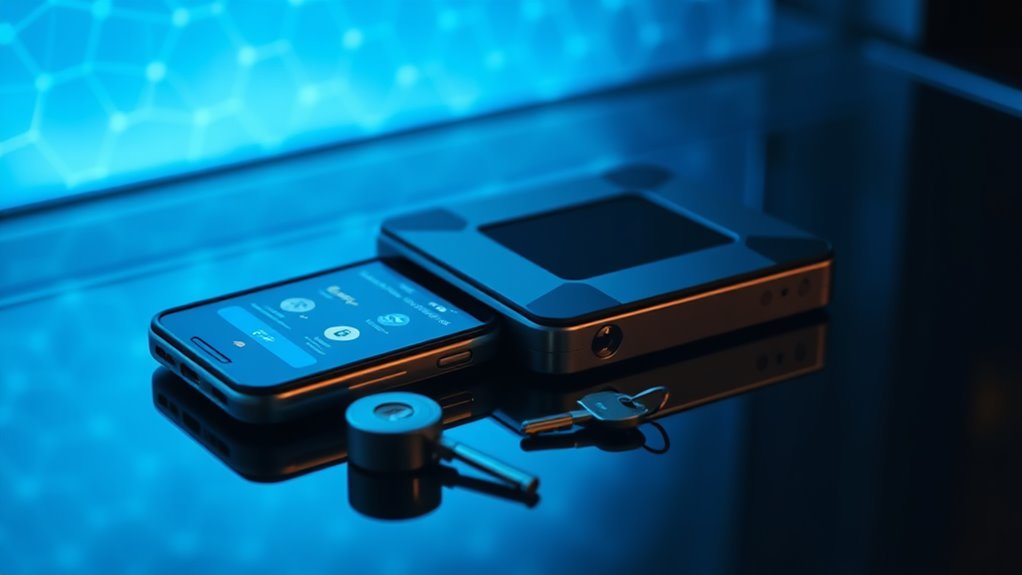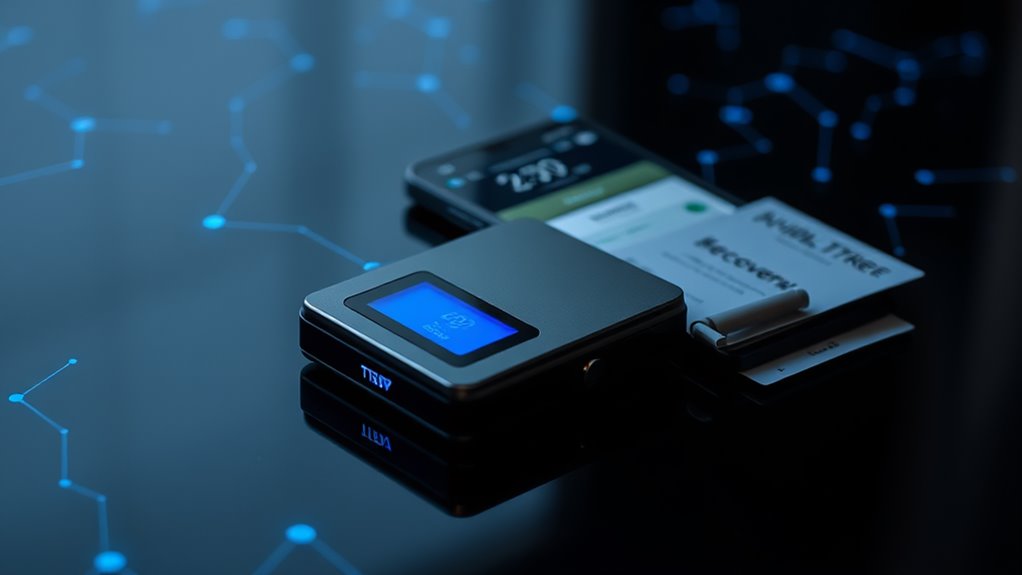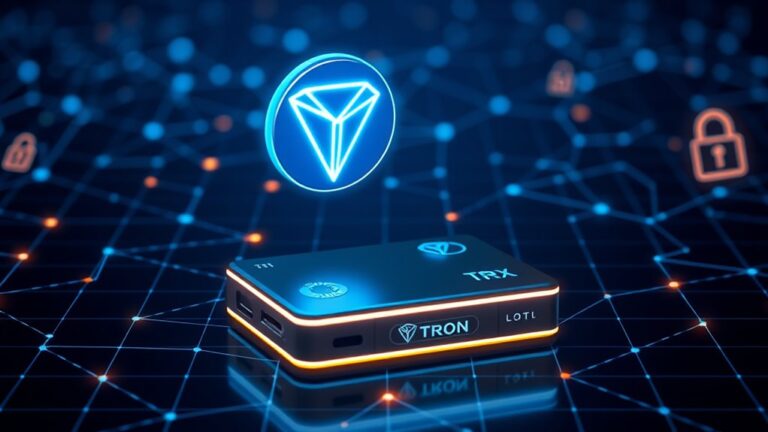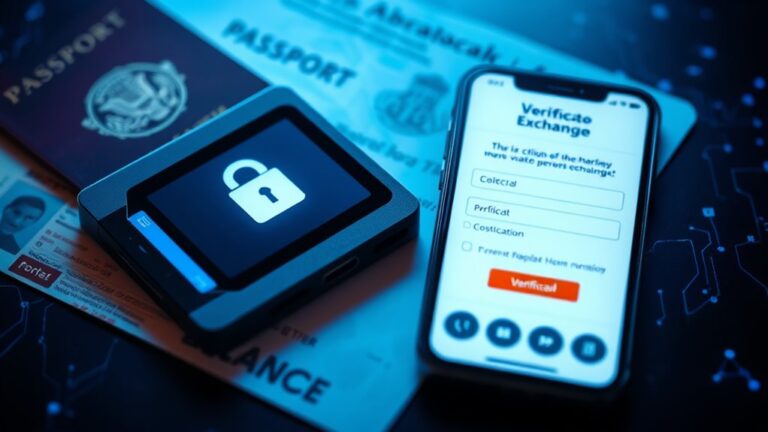Crypto Wallet Apps: Secure Management Solutions
Note: This post may contain affiliate links, and we may earn a commission (with No additional cost for you) if you purchase via our link. See our disclosure for more info. The gold and crypto world is constantly changing. This is not financial, investment, legal, or professional advice. So, please verify the information on the gold and cryptocurrency provider’s websites.
Crypto wallet apps are essential for anyone managing digital assets—think of them as your personal vault. They come in hot and cold varieties, each with varying levels of safety. Sure, they make trading easier, but trust? Not so much. Online threats and phishing scams are large and in charge, so keeping your key secure is on you. Fortunately, many options also offer features like multi-currency support and staking. More insights await if you keep going.

Crypto Wallet Apps are the digital vaults of the cryptocurrency world. They come in various shapes and sizes, catering to both the cautious and the adventurous.
Hardware wallets like Ledger and Trezor are the Fort Knox of this domain—offline, secure, and great for keeping private keys safe from prying eyes. But for those who thrive on convenience, software wallets are the way to go. Desktop, mobile, or web-based, they make managing crypto a breeze, allowing quick access for trading. Backup options are essential features to look for when selecting a wallet to ensure your assets remain recoverable in case of device loss or failure.
Hot wallets are perfect for the active trader, always connected, while cold wallets promise to keep those assets far away from online threats. Hot wallets are typically user-friendly and offer easy access to your crypto assets. Additionally, security features such as strong encryption and two-factor authentication play a crucial role in safeguarding your wallet against unauthorized access.
Then there's the non-custodial versus custodial debate. Non-custodial wallets like Trust Wallet let users hold their own keys, which is like having the ultimate power. Custodial wallets, often linked to exchanges, hold those keys for you—a bit like letting someone else keep your diary. Sure, it might feel safer, but it also means you're trusting them with your secrets.
Features? They're plenty. Multi-currency support allows users to juggle a diverse lineup of cryptocurrencies. Security? Say hello to biometric authentication and two-factor authentication. It's like having a bouncer at the door of your digital vault.
Blockchain integration guarantees compatibility with major networks, while DeFi and staking give users a chance to earn interest on their holdings. Some wallets integrate seamlessly with major exchanges, allowing for easy trading and conversion of assets.
But it's not all sunshine and rainbows. Phishing scams are lurking around every corner. Those “too good to be true” offers? Yeah, they usually are. Cold storage is a solid defense against online threats, while recovery options like seed phrases can save the day if things go sideways.
In a world where every transaction counts, crypto wallet apps are essential. Whether you're a newbie or a seasoned pro, they provide the tools to manage and protect digital assets. Just remember, with great power comes great responsibility.
Frequently Asked Questions
Are Crypto Wallet Apps Compatible With All Cryptocurrencies?
Not all crypto wallet apps play nice with every cryptocurrency. Some are exclusive, like Electrum, which only deals with Bitcoin.
Others, like Coinbase Wallet, have cut ties with various coins. Sure, there are multi-chain wallets out there, but they come with their own quirks.
EVM compatibility? Not guaranteed everywhere. So, compatibility varies widely.
If you're hoping for a one-size-fits-all solution, think again. It's a mixed bag, folks. Good luck!
How Can I Recover a Lost Crypto Wallet App?
Recovering a lost crypto wallet app? Good luck!
First, dig up that seed phrase. You know, the one you probably didn't write down? If that's MIA, you might be out of luck.
Check old devices or backups, but don't count on finding a miracle.
Contact support, but don't hold your breath.
And hey, remember to double-check everything—you don't want to mess up and end up with a big fat “access denied.”
Do Crypto Wallet Apps Charge Transaction Fees?
Do crypto wallet apps charge transaction fees? Oh, absolutely. Just like that unexpected late-night pizza delivery, they come with costs.
Coinbase slaps on a spread and transaction fees. Gemini? They've got a whole maker/taker scheme.
Exodus is your best friend with no commissions—for supported assets, of course. NC Wallet pretends to be fee-free, but beware of hidden costs.
Can I Use Multiple Crypto Wallet Apps Simultaneously?
Sure, you can totally juggle multiple crypto wallet apps at once. Why not? It's like collecting Pokémon, but for your digital cash.
One for daily spending, another for long-term holding, maybe a third for that random altcoin you've got.
Just remember, managing many wallets can get messy—like a teenager's room. So, keep your eyes peeled. It's all about balance.
Too many wallets might just lead to chaos. But hey, live your best crypto life!
What Happens if My Device Is Lost or Stolen?
If that device goes missing, it's panic time.
First, report it stolen—because, you know, law enforcement loves a good story.
Use tracking features to either find it or wipe it clean.
If it's gone for good, transfer your funds using that Secret Recovery Phrase.
Check for backups, if you're lucky enough to have them.
At least, don't forget to tighten up security next time; this isn't a game.












